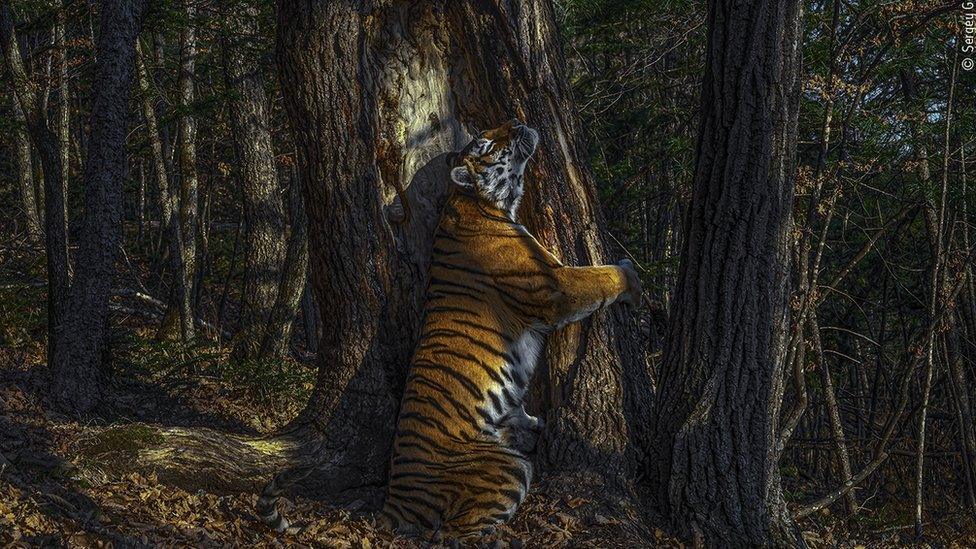Wildlife Photographer of the Year 2020: Check out the winning pics
- Published

This photo was crowned the Grand Title Winner. The title of the photo is 'The Embrace' and it shows an Amur tiger, also known as Siberian tiger, hugging an ancient tree. It was taken by Sergey Gorshkov and took more than 11 months to capture using hidden cameras.
This was named Young Grand Title Winner. 'The fox that got the goose' was taken by Liina who was 13 years old when she took it. This hungry fox, with feathers in its mouth, dragged away the goose that their mother had brought and refused to share with their siblings...cheeky fox.
'A mean mouthful' is the title of this image, by Sam Sloss, who won the 11-14 years old category. Sam took the photo whilst on a diving holiday in Indonesia. He was fascinated by the clown fishes as they swam around hectically and he saw one who always had their mouth open. If you look closely you can see tiny eyes peeping out of its mouth which is a 'tongue-eating louse'.
Look at these small cats photographed in northwest China. This is a rare picture of a family of Pallas's cats also known as manuls. Photographer Shanyuan tracked the family and caught this photo of the kittens, who were being called by their mother to hurry back to safety.
Look at this young male proboscis monkey. He looks like he is posing for the photo or having a moment of meditation. These proboscis monkeys are known for their long noses. They can grow so big that it will hang down over his mouth and he will have to push it aside to eat. These monkeys are only found on the island of Borneo and nearby islands and they are endangered.
Andr茅s won the 10 years and under category with this photo of a stonechat bird perched on a flower stem. Andr茅s sat in the back seat of his dad's car, with his camera out of the window to get this photo.
Look at this frog having a spider snack. This is the first ever picture of this species feeding. Photographer Jaime Culebras walked four hours in heavy rain to get this picture. He found this Manduriacu glass frog eating a spider, clinging onto a branch. It is a newly discovered species which is recognised by the yellow spots on its back and lack of webbing between its fingers.
Look at this incredibly close up shot of two wasps. Could you name them? On the left is a red-banded sand wasp and on the right is a cuckoo wasp. These two species don't usually interact so photographer Frank was very lucky.
This image won the Under Water category. Photographer Songda was diving in the Philippines when he caught this photo of a diamondback squid.
This photo shows a male falcon bring his mate some food. These falcons breed on cliffs and small islands along the Sardinian coast in late summer. Once their chicks are born, they head south mainly to Madagascar.
- Published20 November 2018
- Published16 October 2019
- Published15 December 2017
